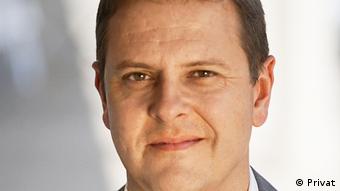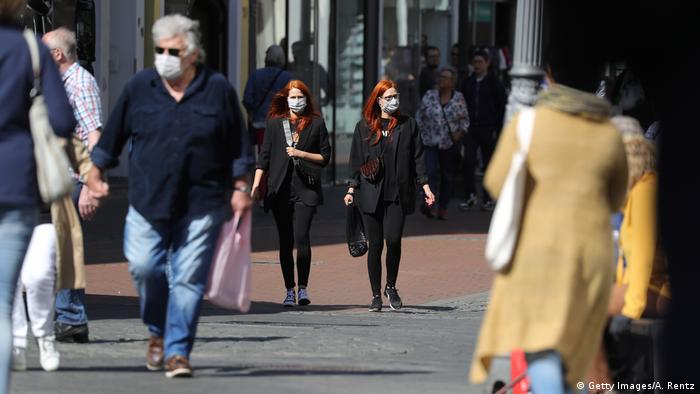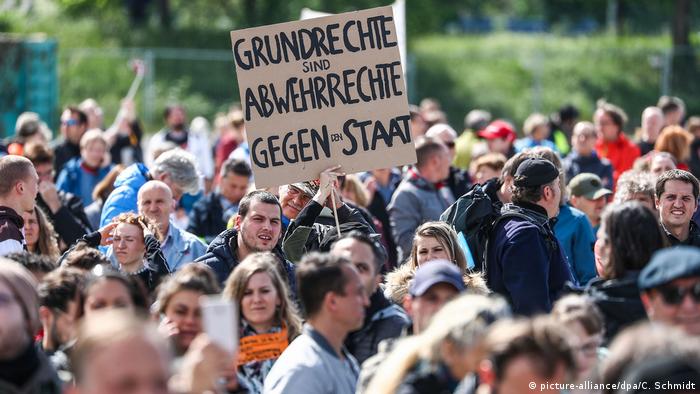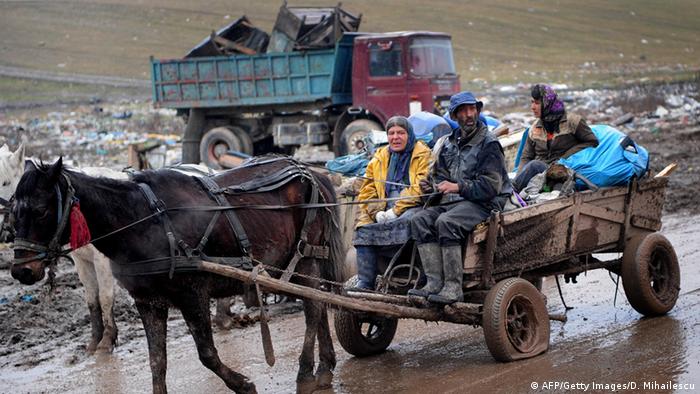Hong Kong: Hundreds arrested as protest movement returns
Police say they have arrested 230 people, some as young as 12, after a weekend of pro-democracy demonstrations. Activists are concerned that pandemic lockdown measures will be used by China to roll back more rights.

Some 230 people were arrested in protests over the weekend in Hong Kong, local authorities said on Monday. Pro-democracy demonstrations have picked back up in the city after weeks of under a coronavirus-related lockdown.
Police said the detainees were between the ages of 12 and 65, and the charges ranged from assaulting an officer to failure to provide proof of identity. Democratic lawmaker Roy Kwong was amongst those arrested, officers said he was being charged with disorderly conduct. Video showed him being surrounded by police and pushed to the ground.
Read more: China: First foreign national prosecuted over Hong Kong protests
On Sunday, protestors had gathered for a sing-along event at a shopping mall when hundreds of riot police were called in to disperse the crowd. According to police, they also blocked roads in the city's Mongkok district and started fires.
Onlookers and journalists also got caught up in the ensuing clashes, with police firing tear gas at reporters and activists alike.

"Some journalists who were sprayed by pepper spray were not allowed to receive immediate treatment, and they were requested to stop filming," said Chris Yeung, chairman of the Hong Kong Journalists' Association.
Several people hospitalized
Footage of the scuffles, which included some people lying on the ground bleeding, were reminiscent of when Hong Kong was brought to a standstill by months of protests last year. At least 18 people had to be brought to local hospitals, the city's Hospital Authority said, including Kwong.
Read more: Lam Wing-Kee: Hong Kong bookseller fights back against China with Taiwan shop
There have been widespread worries amongst democracy advocates in Hong Kong that restrictions put in place to slow the spread of the pandemic will be used by China to further clamp down on rights. For example, a contact-tracing app meant to control who comes into contact with infected people may be used to target anti-Beijing protestors, activists have warned.
Current restrictions only allow public gatherings of a maximum of eight people.
Despite fears across Asia about a possible second wave of the virus, organizers are still planning to hold an annual mass pro-democracy rally on July 1. They say they are expecting two million people to join the even that marks the anniversary of Hong Kong was handed over from British to Chinese rule.
es/mm (AP, Reuters)
DW RECOMMENDS
EU condemns attacks on press freedom during COVID-19 crisis
Ahead of World Press Freedom Day, Germany's foreign minister said independent journalism is being weakened during the coronavirus pandemic. The EU also warned that media freedom is under threat in several countries. (02.05.2020)
Does US-China coronavirus blame game threaten scientific investigation?
China's need for official secrecy and the Trump administration's need for a coronavirus scapegoat, are combining to lend credibility to conspiracy theories. Could science become a victim of the politics of the pandemic? (08.05.2020)
Coronavirus: Travel boss urges EU to relax curbs on tourism
China has lifted its coronavirus ban on selling holiday packages, meaning the Hannover-based TUI Group can resume business. The group wishes the EU would consider doing the same. (04.05.2020)
China's export spike masks darker prospects
China's exports jumped 3.5% in April, with the country exporting millions of tons of medical products. But with demand in the EU and US likely to crash this year, the figures may mask a more complicated picture. (07.05.2020)
EU defends censorship of letter in Chinese newspaper
EU officials have backed a decision to accept China's censorship of a letter that ran in a Chinese newspaper. A sentence referencing China as the origin of the coronavirus outbreak was removed before publication. (07.05.2020)
AUDIOS AND VIDEOS ON THE TOPIC
Martin Lee: 'From now on, China's going to rule Hong Kong with an iron fist'
Date 11.05.2020
Police say they have arrested 230 people, some as young as 12, after a weekend of pro-democracy demonstrations. Activists are concerned that pandemic lockdown measures will be used by China to roll back more rights.

Some 230 people were arrested in protests over the weekend in Hong Kong, local authorities said on Monday. Pro-democracy demonstrations have picked back up in the city after weeks of under a coronavirus-related lockdown.
Police said the detainees were between the ages of 12 and 65, and the charges ranged from assaulting an officer to failure to provide proof of identity. Democratic lawmaker Roy Kwong was amongst those arrested, officers said he was being charged with disorderly conduct. Video showed him being surrounded by police and pushed to the ground.
Read more: China: First foreign national prosecuted over Hong Kong protests
On Sunday, protestors had gathered for a sing-along event at a shopping mall when hundreds of riot police were called in to disperse the crowd. According to police, they also blocked roads in the city's Mongkok district and started fires.
Onlookers and journalists also got caught up in the ensuing clashes, with police firing tear gas at reporters and activists alike.

"Some journalists who were sprayed by pepper spray were not allowed to receive immediate treatment, and they were requested to stop filming," said Chris Yeung, chairman of the Hong Kong Journalists' Association.
Several people hospitalized
Footage of the scuffles, which included some people lying on the ground bleeding, were reminiscent of when Hong Kong was brought to a standstill by months of protests last year. At least 18 people had to be brought to local hospitals, the city's Hospital Authority said, including Kwong.
Read more: Lam Wing-Kee: Hong Kong bookseller fights back against China with Taiwan shop
There have been widespread worries amongst democracy advocates in Hong Kong that restrictions put in place to slow the spread of the pandemic will be used by China to further clamp down on rights. For example, a contact-tracing app meant to control who comes into contact with infected people may be used to target anti-Beijing protestors, activists have warned.
Current restrictions only allow public gatherings of a maximum of eight people.
Despite fears across Asia about a possible second wave of the virus, organizers are still planning to hold an annual mass pro-democracy rally on July 1. They say they are expecting two million people to join the even that marks the anniversary of Hong Kong was handed over from British to Chinese rule.
es/mm (AP, Reuters)
DW RECOMMENDS
EU condemns attacks on press freedom during COVID-19 crisis
Ahead of World Press Freedom Day, Germany's foreign minister said independent journalism is being weakened during the coronavirus pandemic. The EU also warned that media freedom is under threat in several countries. (02.05.2020)
Does US-China coronavirus blame game threaten scientific investigation?
China's need for official secrecy and the Trump administration's need for a coronavirus scapegoat, are combining to lend credibility to conspiracy theories. Could science become a victim of the politics of the pandemic? (08.05.2020)
Coronavirus: Travel boss urges EU to relax curbs on tourism
China has lifted its coronavirus ban on selling holiday packages, meaning the Hannover-based TUI Group can resume business. The group wishes the EU would consider doing the same. (04.05.2020)
China's export spike masks darker prospects
China's exports jumped 3.5% in April, with the country exporting millions of tons of medical products. But with demand in the EU and US likely to crash this year, the figures may mask a more complicated picture. (07.05.2020)
EU defends censorship of letter in Chinese newspaper
EU officials have backed a decision to accept China's censorship of a letter that ran in a Chinese newspaper. A sentence referencing China as the origin of the coronavirus outbreak was removed before publication. (07.05.2020)
AUDIOS AND VIDEOS ON THE TOPIC
Martin Lee: 'From now on, China's going to rule Hong Kong with an iron fist'
Date 11.05.2020
Related Subjects Hong Kong, Coronavirus
Keywords Hong Kong, protests, arrests, democracy, coronavirus
Permalink https://p.dw.com/p/3c1Kj






















.webp)



